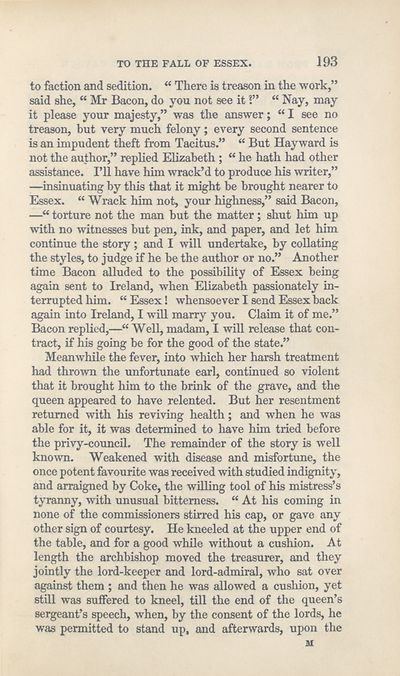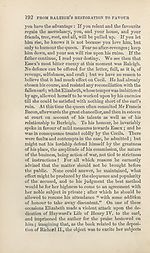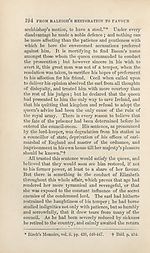Download files
Complete book:
Individual page:
Thumbnail gallery: Grid view | List view

TO THE FALL OF ESSEX.
193
to faction and sedition. “ There is treason in the work,”
said she, “ Mr Bacon, do you not see it 2” “ Nay, may
it please your majesty,” was the answer; “ I see no
treason, but very much felony; every second sentence
is an impudent theft from Tacitus.” “ But Hayward is
not the author,” replied Elizabeth ; “ he hath had other
assistance. I’ll have him wrack’d to produce his writer,”
—insinuating hy this that it might be brought nearer to
Essex. “ Wrack him not, your highness,” said Bacon,
—“ torture not the man but the matter; shut him up
with no witnesses but pen, ink, and paper, and let him
continue the story ; and I will undertake, hy collating
the styles, to judge if he be the author or no.” Another
time Bacon alluded to the possibility of Essex being
again sent to Ireland, when Elizabeth passionately in¬
terrupted him. “ Essex! whensoever I send Essex back
again into Ireland, I will marry you. Claim it of me.”
Bacon replied,—“ Well, madam, I will release that con¬
tract, if his going be for the good of the state.”
Meanwhile the fever, into which her harsh treatment
had thrown the unfortunate earl, continued so violent
that it brought him to the brink of the grave, and the
queen appeared to have relented. But her resentment
returned with his reviving health; and when he was
able for it, it was determined to have him tried before
the privy-council. The remainder of the story is well
known. Weakened with disease and misfortune, the
once potent favourite was received with studied indignity,
and arraigned by Coke, the willing tool of his mistress’s
tyranny, with unusual bitterness. “ At his coming in
none of the commissioners stirred his cap, or gave any
other sign of courtesy. He kneeled at the upper end of
the table, and for a good while without a cushion. At
length the archbishop moved the treasurer, and they
jointly the lord-keeper and lord-admiral, who sat over
against them ; and then he was allowed a cushion, yet
still was suffered to kneel, till the end of the queen’s
sergeant’s speech, when, by the consent of the lords, he
was permitted to stand up, and afterwards, upon the
M
193
to faction and sedition. “ There is treason in the work,”
said she, “ Mr Bacon, do you not see it 2” “ Nay, may
it please your majesty,” was the answer; “ I see no
treason, but very much felony; every second sentence
is an impudent theft from Tacitus.” “ But Hayward is
not the author,” replied Elizabeth ; “ he hath had other
assistance. I’ll have him wrack’d to produce his writer,”
—insinuating hy this that it might be brought nearer to
Essex. “ Wrack him not, your highness,” said Bacon,
—“ torture not the man but the matter; shut him up
with no witnesses but pen, ink, and paper, and let him
continue the story ; and I will undertake, hy collating
the styles, to judge if he be the author or no.” Another
time Bacon alluded to the possibility of Essex being
again sent to Ireland, when Elizabeth passionately in¬
terrupted him. “ Essex! whensoever I send Essex back
again into Ireland, I will marry you. Claim it of me.”
Bacon replied,—“ Well, madam, I will release that con¬
tract, if his going be for the good of the state.”
Meanwhile the fever, into which her harsh treatment
had thrown the unfortunate earl, continued so violent
that it brought him to the brink of the grave, and the
queen appeared to have relented. But her resentment
returned with his reviving health; and when he was
able for it, it was determined to have him tried before
the privy-council. The remainder of the story is well
known. Weakened with disease and misfortune, the
once potent favourite was received with studied indignity,
and arraigned by Coke, the willing tool of his mistress’s
tyranny, with unusual bitterness. “ At his coming in
none of the commissioners stirred his cap, or gave any
other sign of courtesy. He kneeled at the upper end of
the table, and for a good while without a cushion. At
length the archbishop moved the treasurer, and they
jointly the lord-keeper and lord-admiral, who sat over
against them ; and then he was allowed a cushion, yet
still was suffered to kneel, till the end of the queen’s
sergeant’s speech, when, by the consent of the lords, he
was permitted to stand up, and afterwards, upon the
M
Set display mode to:
![]() Universal Viewer |
Universal Viewer | ![]() Mirador |
Large image | Transcription
Mirador |
Large image | Transcription
| Antiquarian books of Scotland > Politics & government > Life of Sir Walter Raleigh > (199) |
|---|
| Permanent URL | https://digital.nls.uk/113654792 |
|---|
| Description | Thousands of printed books from the Antiquarian Books of Scotland collection which dates from 1641 to the 1980s. The collection consists of 14,800 books which were published in Scotland or have a Scottish connection, e.g. through the author, printer or owner. Subjects covered include sport, education, diseases, adventure, occupations, Jacobites, politics and religion. Among the 29 languages represented are English, Gaelic, Italian, French, Russian and Swedish. |
|---|

